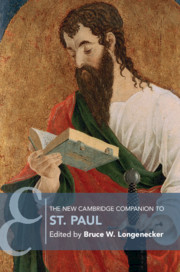Book contents
- The New Cambridge Companion to St. Paul
- Cambridge Companions to Religion
- The New Cambridge Companion to St. Paul
- Copyright page
- Dedication
- Contents
- Map
- Contributors
- Abbreviations
- Part I Paul, Letters and Communities
- Part II The Pauline Letter Collection
- Part III Paul’s Theological Discourse
- 9 What Did Paul Think Is Wrong in God’s World?
- 10 What Did Paul Think God Is Doing about What’s Wrong?
- 11 What Did Paul Think God Is Doing in Christian Communities?
- 12 How Did Paul Read Scripture?
- 13 Did Paul Abandon either Judaism or Monotheism?
- 14 Why Were People Attracted to Paul’s Good News?
- 15 How Was the Reception of Paul Shaped in the Early Church?
- 16 What Makes Paul Challenging Today?
- Bibliography
- Index of Biblical and Ancient Writings
- Index of Modern Scholars
- Cambridge Companions to Religion (continued from page iii)
- References
10 - What Did Paul Think God Is Doing about What’s Wrong?
from Part III - Paul’s Theological Discourse
Published online by Cambridge University Press: 19 June 2020
- The New Cambridge Companion to St. Paul
- Cambridge Companions to Religion
- The New Cambridge Companion to St. Paul
- Copyright page
- Dedication
- Contents
- Map
- Contributors
- Abbreviations
- Part I Paul, Letters and Communities
- Part II The Pauline Letter Collection
- Part III Paul’s Theological Discourse
- 9 What Did Paul Think Is Wrong in God’s World?
- 10 What Did Paul Think God Is Doing about What’s Wrong?
- 11 What Did Paul Think God Is Doing in Christian Communities?
- 12 How Did Paul Read Scripture?
- 13 Did Paul Abandon either Judaism or Monotheism?
- 14 Why Were People Attracted to Paul’s Good News?
- 15 How Was the Reception of Paul Shaped in the Early Church?
- 16 What Makes Paul Challenging Today?
- Bibliography
- Index of Biblical and Ancient Writings
- Index of Modern Scholars
- Cambridge Companions to Religion (continued from page iii)
- References
Summary
Through the coming, death, and resurrection/exaltation of the Messiah Jesus, God has graciously determined to rescue humanity from the powers of Sin and Death, thereby creating a forgiven, liberated, and reconciled people: the community of the new creation and new covenant. By faith and baptism, and through the work of God’s empowering, indwelling Spirit, people may participate in this saving, transformative event and thus live “in Christ,” experiencing the fullness of life with God and others for which they were created, in anticipation of the restoration of the entire creation.
- Type
- Chapter
- Information
- The New Cambridge Companion to St. Paul , pp. 187 - 209Publisher: Cambridge University PressPrint publication year: 2020



